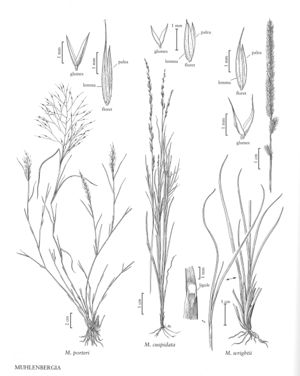Difference between revisions of "Muhlenbergia cuspidata"
FNA>Volume Importer |
imported>Volume Importer |
||
| (3 intermediate revisions by 2 users not shown) | |||
| Line 4: | Line 4: | ||
|publications= | |publications= | ||
|common_names=Plains muhly | |common_names=Plains muhly | ||
| + | |special_status={{Treatment/ID/Special_status | ||
| + | |code=E | ||
| + | |label=Endemic | ||
| + | }} | ||
|basionyms= | |basionyms= | ||
|synonyms= | |synonyms= | ||
| Line 39: | Line 43: | ||
|publication title= | |publication title= | ||
|publication year= | |publication year= | ||
| − | |special status= | + | |special status=Endemic |
| − | |source xml=https:// | + | |source xml=https://bitbucket.org/aafc-mbb/fna-data-curation/src/200273ad09963decb8fc72550212de541d86569d/coarse_grained_fna_xml/V25/V25_739.xml |
|subfamily=Poaceae subfam. Chloridoideae | |subfamily=Poaceae subfam. Chloridoideae | ||
|tribe=Poaceae tribe Cynodonteae | |tribe=Poaceae tribe Cynodonteae | ||
Latest revision as of 17:58, 11 May 2021
Plants perennial; cespitose, with knotty bases, not rhizomatous. Culms 20-60 cm tall, 1-2 mm thick, erect, not rooting at the lower nodes; internodes mostly glabrous or sparsely hispidulous, always hispidulous below the nodes. Sheaths shorter than the internodes, laterally compressed, keeled, smooth or scabridulous, not becoming spirally coiled when old; ligules 0.2-0.8 mm, membranous, truncate; blades 2-22 cm long, 0.5-2.7(3.5) mm wide, flat to folded, smooth or scabridulous abaxially, strigose adaxially. Panicles 4-14 cm long, 0.1-0.8 cm wide, spikelike, not dense; primary branches 0.4-3 cm, appressed; pedicels 0.1-1.2(4) mm. Spikelets 2.5-3.6 mm, dark green or plumbeous, occasionally with 2 florets. Glumes subequal, 1.2-3 mm, about 3/4 as long as the spikelets, 1-veined, gradually acute to acuminate, occasionally mucronate, mucros to 0.3 mm; lemmas 2.5-3.6 mm, lanceolate, sometimes mottled with greenish-black areas, with short, appressed hairs on the basal 1/2 - 3/4 of the midveins and margins, apices acuminate, sometimes mucronate, mucros to 0.6 mm; paleas 2.4-3.6 mm, lanceolate, glabrous, acuminate; anthers 1.2-1.8 mm, greenish. Caryopses 1.6-2.3 mm, fusiform, brownish. 2n = 20.
Distribution
Alta., Man., Sask., Pa., Colo., N.Mex., Mont., Mo., Minn., Mich., Wis., Tenn., Kans., N.Dak., Nebr., S.Dak., Va., Ark., Ill., Ind., Iowa, Okla., Ky., Ohio, Wyo.
Discussion
Muhlenbergia cuspidata grows in dry, gravelly prairies, on gentle rocky slopes, rocky limestone outcrops, and in sandy drainages, at elevations of 300-1400 m, primarily in the central portion of the flora region. It flowers from June to October.
Muhlenbergia cuspidata is often confused with M. ricbardsonis, but that species has rhizomes and longer ligules. Morden and Hatch (1984) found cleistogamous panicles in the lower sheaths of a plant from Benton County, Oklahoma.
Selected References
None.
